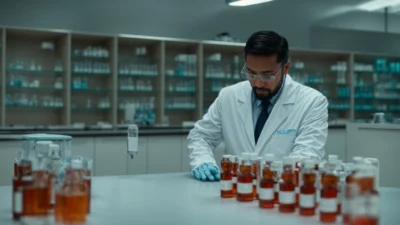Understanding Depression and Treatment Challenges
With a prevalence of around 10%, depression is among the most common mental health issues in Australia. Although not all patients respond favourably to traditional treatments, first-line therapy continues to include antidepressant medications and psychosocial therapies. Subpar symptom alleviation or problematic side effects affect a large percentage of people.
It becomes critical to identify alternate or additional therapies for those whose depression is resistant to treatment. Some healthcare providers and patients are exploring the possibility that medicinal cannabis could be helpful in managing depression to find more effective choices.
Endocannabinoids and Mood Regulation
An endocannabinoid system is present in humans and is involved in the regulation of emotional states, stress reactions, and mood. The Lambert Initiative for Cannabinoid Therapeutics and other researchers have shown that long-term stress may reduce endocannabinoid production in the brain, which may amplify depressive symptoms.
There is a difference in the manner that THC and CBD, the two main chemicals in cannabis, engage with this system. Because it does not produce intoxicating effects, cannabidiol, or CBD, has attracted a lot of attention as a potential treatment for mental health issues. When conventional treatments for depression fail, some patients may turn to medical cannabis in the hopes that it will normalise their endocannabinoid function and alleviate their symptoms.
Latest Findings on Medical Cannabis for Depression
Medical cannabis as a treatment for depression is an emerging field of study. The direction of causality is unclear, but there is a small non-causal relationship between recreational cannabis usage and depression. In terms of formulation, dose, and administration, however, therapeutic cannabis products are very different from recreational cannabis.
According to recent research out of Australia, some people who were administered medical cannabis for other reasons also saw improvements in their depression symptoms. Three months of medical cannabis treatment reduced anxiety, sadness, and pain levels significantly, according to an Australian study published in PLOS ONE in 2023.
Note that many medical experts see no proof of medicinal cannabis’ efficacy in treating depression at this time. Since no randomised controlled trials have specifically targeted depression as a key result, we typically do not recommend medical cannabis as an initial treatment for depression.
When Might Medical Cannabis Be Considered?
In most cases, medical cannabis is not recommended as a first treatment for depression. According to standard clinical practice, it can be considered when:
- The patient has exhausted all traditional treatment options without finding any alleviation.
- Conventional medicine has terrible side effects.
- Medical cannabis may be helpful for the patient’s several ailments (such as chronic pain).
Horizon Health’s medical staff treats mental health, considering the specific needs of each patient. When necessary, we tailor treatment programmes for each individual patient, which may involve a variety of natural therapies.
The Patient Experience and Quality of Life
The quality of life of depressed patients who have not improved with standard therapy is of the utmost importance. When alternative treatments failed to alleviate symptoms adequately, some people found relief through medical cannabis, which improved their overall health and ability to operate.
Improvements in health-related quality of life and weariness were noted by patients using medical cannabis, according to research conducted in 2023 at the University of Sydney. Based on these results, medical cannabis might have additional uses outside relieving symptoms for certain people.
Many people who suffer from depression wonder if drugs containing CBD or THC are more effective. Due to its non-psychoactive nature, CBD has become increasingly popular for its uses in mental health, but the best way to take it will depend on the person.
Considerations and Potential Concerns
Medical cannabis has several risks, although some patients claim benefits from use. Several crucial aspects must be considered:
- Distinct personal traits: There is a wide range of individual responses to medical cannabis.
- Possible adverse reactions: Possible symptoms include lethargy, altered hunger levels, or parched mouth.
- Incompatible drugs: There are potential drug interactions that may occur with medicinal cannabis.
- Legal factors: Only registered medical practitioners in Australia can obtain medical cannabis.
The complicated network of connections between cannabis and psychological well-being deserves careful consideration. While some people have reported improvement, others may find that their symptoms have worsened due to incorrect use or goods that are not suitable for their needs.
Horizon Health Approach to Depression Management
Here at Horizon Health, we know that treating depression can be a complex and unique process. To find out if medical cannabis could be a good fit for your treatment plan, our telemedicine clinic connects you with healthcare experts that have experience with natural medicines.
In our view, patient-centred care involves:
- Honour the individuality of your health journey
- Thinks about every possible choice supported by evidence
- Focuses on promoting health and happiness
- Offers continuous assistance and supervision
To make sure you know all the facts you need to make educated decisions about your health, our healthcare experts will go over the possible benefits and dangers with you.
Looking to the Future
Important clinical trials on the use of medicinal cannabis to treat depression are currently underway, with prominent Australian institutions such as the Lambert Initiative at the forefront of these efforts. New data and more precise recommendations for treatment may become available as our knowledge grows.
If traditional methods of treating depression have failed, it is critical that people with this condition have access to educated medical professionals who are prepared to explore all their treatment choices. As always, Horizon Health will do its best to keep up with the latest research and offer caring, evidence-based treatment.
Our healthcare team offers telemedicine consultations for anyone interested in learning more about holistic methods of depression treatment, including the possibility of discussing medicinal cannabis.
Disclaimer: This information is provided for educational purposes only and complies with TGA regulations. No therapeutic claims about medicinal cannabis are made or implied. In Australia, medicinal cannabis is only available with a prescription following assessment by an authorised healthcare practitioner. Always consult a qualified healthcare professional before considering any treatment options.










